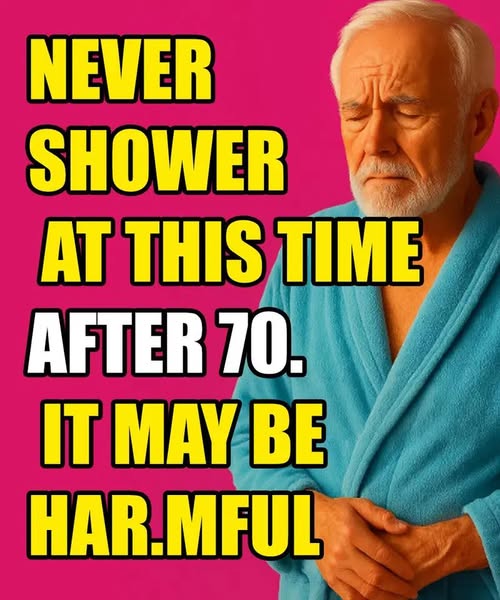Why Bath Time Matters More Than You Think
Showering is such a daily habit that few people give it much thought. But for older adults, the timing of a bath can make a big difference in safety and health—sometimes even saving a life.
A recent news story brought this to light when a 75-year-old man collapsed and died after showering at a risky time. This sad event isn’t an isolated accident. It’s a warning that for older people, showering at the wrong moment can trigger drops in blood pressure, heart stress, and dangerous falls.
The good news is, these risks are easily avoided with a little knowledge and some simple changes in routine.
What Is the Riskiest Time of Day to Shower?
The most dangerous time for older adults to shower is very early in the morning, right after waking up. At this time, the body is still waking up too—your blood pressure is often lower, and your circulatory system is not yet ready for big changes. Stepping into a hot or cold shower too soon can cause your blood vessels to relax, dropping your pressure even more and raising your chances of dizziness, fainting, or worse.
Another tricky time is right after eating. When you’re digesting food, a lot of your blood flow is busy helping your stomach. If you shower during this time, your body has to send blood to your skin as well, which can lead to a sudden drop in blood pressure or even cause fainting.
What Can Happen If You Shower at the Wrong Time?
The risks go beyond just a little lightheadedness. Common effects include:
-
Sudden low blood pressure
-
Loss of balance and dangerous falls
-
Passing out, which can result in injuries to the head or back
-
Muscle cramps caused by quick changes in water temperature
-
In rare cases, heart complications in people with certain medical conditions
Add in a bathroom without safety features—no grab bars, no non-slip mat, no bath seat—and the risks multiply.
How Does Your Body Respond?
Blood Pressure Drops:
After waking up, your pressure is usually lower. A hot shower can make this drop even more, leading to dizziness.
Competing for Blood Flow:
Showering right after eating puts extra demand on your body, which is still busy digesting food. This can cause more pronounced discomfort.
Heat Stress:
Big temperature changes can shock the body, especially for people with heart issues.
What’s the Safest Time to Shower?
The safest times are:
-
Mid-morning, between 9 a.m. and 11 a.m. when your body is fully awake and blood pressure is stable.
-
Mid-afternoon, between 3 p.m. and 5 p.m. when circulation is active, especially after a walk or light activity.
Try to avoid showering immediately after getting up or right after a meal. If you’ve just eaten, wait at least 40 minutes before stepping into the shower.
Tips for a Safer, More Comfortable Bath
-
Use warm water, not hot or cold, to avoid shocking your system.
-
Install grab bars and place non-slip mats in the shower.
-
Use a bath seat if you ever feel weak or unsteady.
-
If you take medication that lowers blood pressure, have someone nearby or let them know you are bathing.
-
Keep the bathroom well-ventilated to prevent steam buildup.
-
Stay hydrated before and after bathing.
-
Let someone know if you are showering, especially if you live alone.
What If You Have Health Conditions?
If you have diabetes, low blood pressure, heart problems, frequent dizziness, or are over 65 with any major health issues, talk with your doctor. They can help you set a shower routine that keeps you safe and comfortable.
How to Bring Up the Topic with Loved Ones
If your parent or grandparent is set in their ways, approach the subject gently:
-
Share helpful information like this guide.
-
Use a supportive tone and suggest alternatives, such as, “How about a bit later in the morning?”
-
Help prepare the bathroom for their safety and comfort.
-
Offer help if needed, or simply keep them company.
Bathing Should Feel Good
Taking a shower is about more than staying clean. It’s a moment of self-care, comfort, and even relaxation. By making a few smart changes, you can keep this daily habit safe and enjoyable at any age.
Just that—taking a little care with your routine can help you feel your best, day after day.
